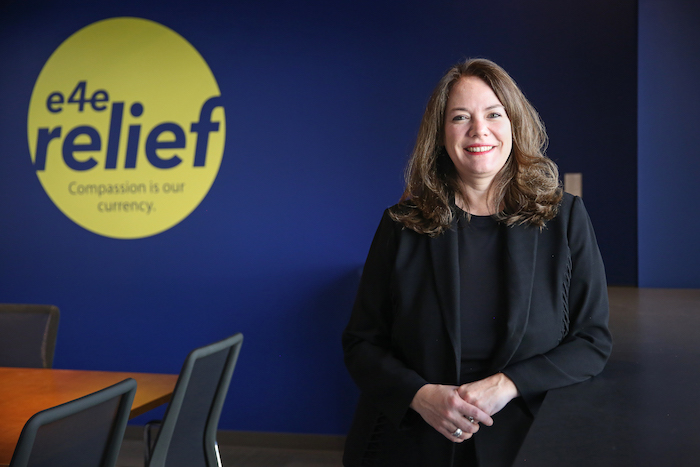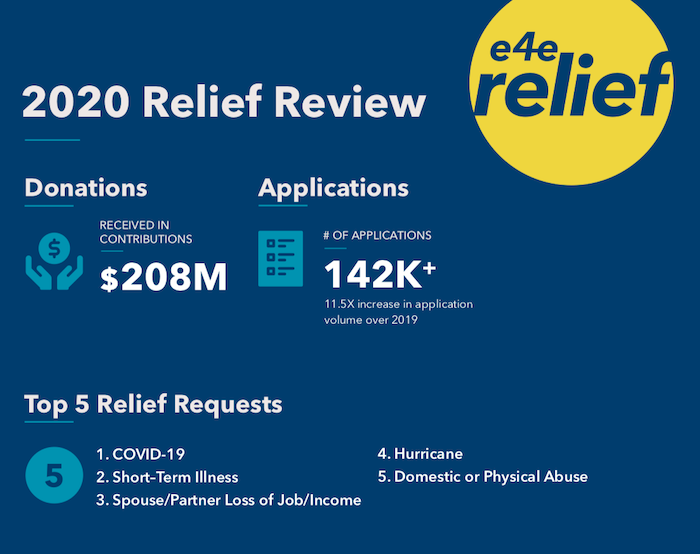“Our tagline is ‘Compassion is our currency.’” That’s how Holly Welch Stubbing (’93) describes her work awarding tens of millions of dollars — more than $100 million in 2020 alone — to people around the world who are suffering through weather-related disasters, financial hardships and, in the last year, COVID-19.
“It’s about the people that come to us at a time when they’ve had a disaster or hardship in their lives. There is a strong need to listen and understand and be empathetic. Offering compassion is something that everyone understands. Everyone understands offering it, and everyone understands needing it from time to time. That’s at the core of what we’re trying to deliver.”
Stubbing is president and CEO of E4E Relief LLC, one of the country’s largest administrators of employee relief funds, and an executive vice president with E4E Relief’s parent organization, Foundation For The Carolinas, based in Charlotte. An employee relief fund, typically funded by a company, its executives and often employees themselves, provides financial support to help employees with food, housing, transportation, utility bills and medical expenses during times of unexpected crises.
Stubbing, who lives in Charlotte with her husband, Matt (MBA ’03), and two children, has worked with Foundation For The Carolinas since 1998 and has overseen much of the growth of E4E Relief since it was formed two decades ago. COVID-19 has radically increased the number of companies offering employee relief funds and the number of employees seeking help.
E4E Relief managed 50 companies’ programs covering 2.5 million employees before the pandemic. It works with 110 companies covering 5 million employees now and received 149,000 applications for assistance in the last year. Grants to individuals increased from $12.5 million in 2019 to $103 million, led by COVID relief, in 2020. While most of the recipients were in the United States, grants went to people in more than 100 countries.
Beyond the numbers are the people receiving help, often during the worst moments in their lives. “You get such an understanding of what it can mean to a family to have relief in the right moment, in the right way, in the right amount,” Stubbing says. “We get handwritten thank-you notes, unbelievable notes.”
Wake Forest Magazine talked with Stubbing about her work. The conversation has been condensed and edited for clarity.

Holly Welch Stubbing ('93) is president and CEO of E4E Relief, one of the country’s largest administrators of employee relief funds. (Photo courtesy Charlotte Business Journal)
How did E4E Relief start?
When 9/11 happened, two banks headquartered in Charlotte at the time, Wachovia (now Wells Fargo) and Bank of America, lost employees in that tragedy. Within 24 hours, we (Foundation For The Carolinas) got a call from the CEOs asking if we would create a fund for their employees. There were a lot of 9/11 funds that were ultimately created, but this was a more localized version. After 9/11, Wachovia said, “Would you consider running something for the whole country for our employee base?” After Hurricane Sandy hit the Northeast (in 2012), Bank of America came back around and asked if we knew anyone doing (employee relief funds).
The Sandy experience was formative to determine if this should stay in the Foundation. We started getting calls from companies all over the world. This is different from most foundations that make grants to nonprofits; this was making grants to individuals. You’re talking about scaling up during a disaster and then scaling back down. It’s a social enterprise that has an impact of helping people with housing and food and medical bills and other things. E4E Relief launched as a separate organization in 2015.
What helped you develop a sense of compassion and drew you to this type of work?
Being an only child and growing up in our faith institution and volunteering where I grew up (in Knoxville, Tennessee) … then coming to Wake, and Wake Forest nurtured that. There were plenty of opportunities at Wake, given the overall framing of the University, that you’re not here just for yourself. You’re here for humanity. I do think that carries through. Of the three universities that I attended — Wake Forest, University of Dayton (for law school) and Georgetown (MBA) — all have a focus toward humanity. I love to learn, and I’m curious about a lot of things, which is why I went to three schools. I like to have the public community overlay to what I’m doing with the nonprofit world and trying to marry the two.
You’ve spent much of your career at foundations making gifts to other nonprofits. What is it about your work now of directly helping individuals that appeals to you?
Giving person to person has become a trend. People want to understand the impact at a very granular level. It’s why people love (giving) scholarships because there is an identifiable person that you’re giving to and you can often meet them and follow their career. There’s something about relief programs that do that as well. When something happens to a person, I know that the program (E4E Relief) will help that person. I think that’s why I’ve evolved to this work that combines compassion and feeling very close to (the recipients). Being a little closer gives you a real sense of how you’re helping people.
"As Wake Forest graduates, we’re called to reach out beyond our own circumstances to understand what others around us need and step up and be leaders and put ourselves in a position to help."
How has COVID changed what you do?
The pandemic has definitely stretched the definition of what relief is. One of our companies uses their program to assist with child care (expenses) for those who are trying to get back to work. That was different and a move in the direction of saying, “Yes, child care is unique in this pandemic, a real crisis.” We had to evaluate that legally, create the policy around it and move forward as a means of trying to help people in a different way. I would say that people have been really generous and thoughtful about how to use a relief program, maybe slightly different than before.
Let’s say I’m CEO of a large corporation. How do you sell me on the idea of starting a relief fund for my employees?
I tell CEOs that they are investing in the well-being of their employees, solving for readiness in disasters and creating a socially responsible platform to meet their environmental, social and governance objectives. There are definitely positive outcomes for companies. There are signs that point toward greater loyalty and a likelihood of (employees) being back on the job faster and being more focused at work because you’re not as worried about what happened. The resources help create a better sense of peace and well-being. They’re taking care of their corporate social responsibility response. (Companies are) addressing human resource issues that are going to be there whether they have this program or not, and trying to find an equitable way to address it. Relief funds help support a lot of the (needs) around economic opportunity, mobility, race and health care disparities.
What type of disasters and financial hardships are typically covered by a company’s plan?
When you work with this many companies, you’re always going to have a weather-related disaster — tornadoes, hurricanes, floods. So you have certain things that are predictable and that you can model. Then there’s something like domestic violence. The IRS doesn’t treat domestic violence as a disaster in the traditional sense. It’s typically a financial hardship case, although if the point of a catastrophic disaster is to get somebody out of harm’s way, then clearly domestic violence is a hardship. Approval rates are much higher for disasters, because you either experienced one or you didn’t. Hardship applications require more analysis, and we interview almost every hardship applicant. You cannot understand these stories without really interviewing people.

How has it changed you to see the human toll of survivors of disasters, if not meeting them in person than through the applications for assistance that E4E Relief receives?
I think I’m forever changed after the last few years. I will never be the same after listening to COVID needs meet social justice needs meet every disaster in the world. What we know about people applying (for help) and what we know about economic mobility, I feel like I’m sitting in the center of something very important, and I want to be a good steward in the best way that I can. In 2017 you had three hurricanes — Harvey, Irma and Maria — two wildfires in California and an earthquake in Mexico in 16 weeks. That was a fantastically difficult year for so many. It’s been a learning experience watching how climate change is changing our work.
Does your work help you teach empathy to your kids (a son, 7 and a daughter, 12)?
Definitely. My kids live and breathe E4E and disasters. They have a tremendous understanding of what happens to people and what they face and why I’m doing what I’m doing. It’s such a fantastic way to talk to children about helping others. It’s very tangible to them.
What are you focused on right now?
We’re seeing a lot of activity in Indonesia. We have a corporation that has a plant there, and they’re using the program to assist people who have COVID. In Texas, we’ve had 1,700 applications from one area in 15 days. It’s burst pipes, home repairs, evacuation needs. Their whole house is destroyed, there’s no electricity, there’s COVID. Where are you supposed to go? Mostly right now it’s evacuation expenses, but it’s going to become long-term support for housing.
How has leading E4E Relief changed you?
As Wake Forest graduates, we’re called to reach out beyond our own circumstances to understand what others around us need and step up and be leaders and put ourselves in a position to help.

"We were able to go out to California (in 2018) and meet with wildfire victims who had lost everything.... When you’re faced with the person standing in front of you, it hits home in a different way. It has expanded my understanding of what people face and forced me to think about things differently." -- Holly Welch Stubbing ('93)


